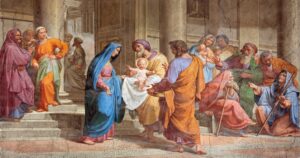Consider the following from John T. Pless:
The liturgy is Gottesdienst, divine service, the Lord’s service to us through the proclamation of His Word and the giving out of His body and blood. In the theology of the Lutheran Confessions,
God is the subject not the object of liturgical action. The trajectory is from the Lord to His Church and then from the Church to her Lord. In Luke 22, just after He had established the supper of His body and blood, the Lord says, “I am among you as one who serves” (v.22). This verse embodies the Lutheran understanding of the liturgy; it is the service that Jesus renders to His church, given by grace and received by faith. Rome had reversed the flow with the insistence that the Mass is essentially a sacrifice that the church offers to God. Reformed Protestants likewise define worship as human activity, i.e. the church’s obedient ascription of praise to the majesty of a sovereign God.
For confessional Lutherans, liturgy is not about human activity but about the real presence of the Lord who stoops down to put His words into our ears and His body and blood into our mouths. Liturgy, as it is divine service, delivers the forgiveness of sins. The liturgy does not exist to provide edifying entertainment, motivation for sanctified living, or therapy for psychological distresses, but the forgiveness of sins.
John T. Pless, “Divine Service: Delivering Forgiveness of Sins,” ¶¶ 5-6, presented at the South Dakota District Lay/Clergy Conferences, Rapid City, SD May 6, 1995 and Sioux Falls, SD May 7, 1995, then Pastor of University Lutheran Chapel, Minneapolis, MN.
In the worship of Cain, we bring to God our own self-chosen service. In the worship of Abel, we believe God to receive his chosen gifts to us.
- Contrast the directions: from us to God, or from God to us.
- Contrast the activity: working, or believing; giving, or receiving.
- Contrast the choosers: us, or God.
- Contrast the effects: the forgiveness of sins is delivered, or it is not.




